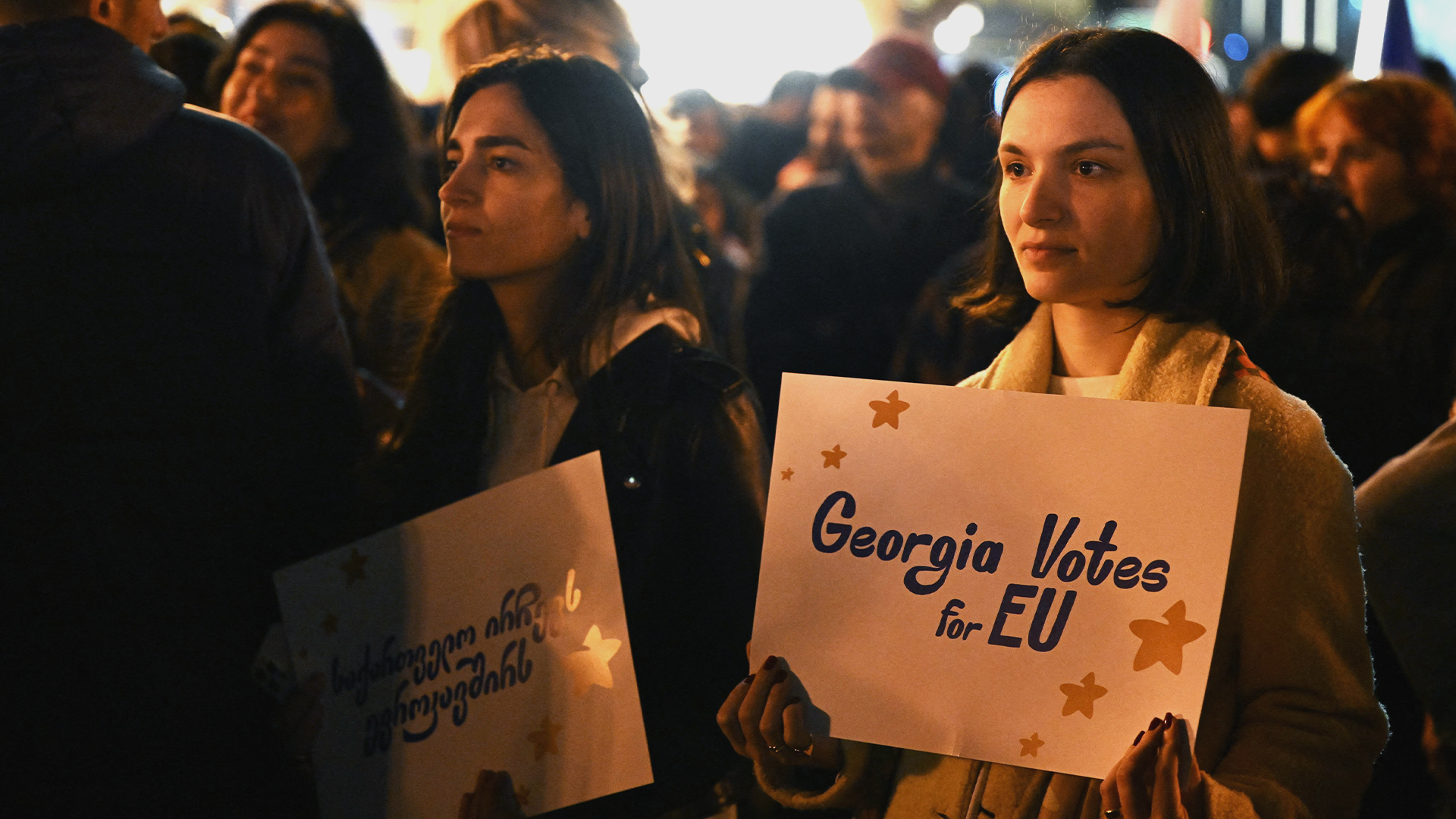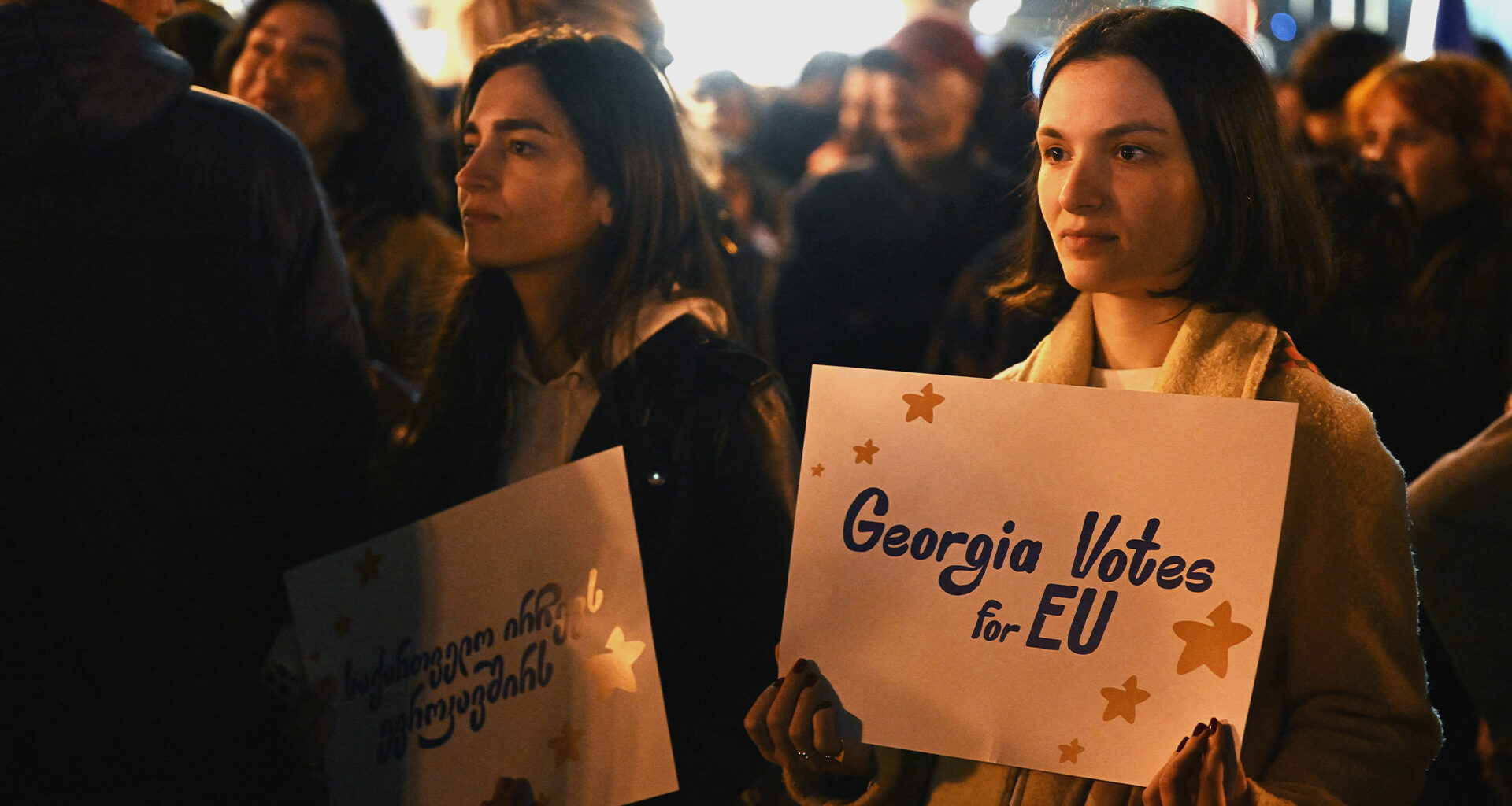

VANO SHLAMOV/AFP via Getty Images
Just like in the United States, the electoral battles happening this week in Georgia and Moldova feel existential to all participating sides. For the two small nations the choice is between a future that is aligned with Europe or one controlled by the old colonial master, Russia.
In Moldova, the pro-European president failed to secure victory in the first round, but the referendum, which will enshrine Moldova’s pursuit of EU membership in the country’s constitution, narrowly passed with 50.38%.
In Georgia, the country’s pro-Western path is already ingrained in the constitution but the ruling Georgian Dream party, led by a pro-Russian oligarch Bidzina Ivanishvili, has turned increasingly anti-Western and threatens to reverse it. Tens of thousands of protesters waving EU flags in the Georgian capital, Tbilisi, worry they are about to lose the promise of independence that generations prior have fought and died for.
“The subsequent days and possibly weeks in Georgia is something that sometimes generations pass without experiencing. The quest to save your country is a terrifying responsibility, a debilitating endeavor, a great privilege, and an unparalleled sense of fulfillment,” writes opposition supporter Marika Mikiashvili.
Polls have consistently shown that around 80% of Georgians want the country to join the European Union and NATO. The ambition of being part of the European family is seen as the only way to protect Georgia from Russia, whose military already occupies a fifth of Georgia’s internationally recognized territory.
The results of the second round in Moldova and the upcoming Sunday election in Georgia are also part of a larger context determined by the election cycle in the US. The U.S. election result will have a direct effect on the war in Ukraine, which in turn determines the future of the entire region. Moscow is cheering for Trump. This week, the Russian state media widely quoted former president Medvedev who praised Trump as “the most significant US figure to admit Vladimir Zelensky’s responsibility for the Ukrainian conflict”
Zooming out: Left and increasingly far right-leaning forces in the West often argue that Russia should have the control of their backyard and that Washington and Brussels need to stop interfering in the region. This argument is in itself colonial: just like in Ukraine, Moldova’s and Georgia’s fight for independence is also the fight against historic racism and colonial attitudes aimed at non-ethnically Russian people who have been forced into the Russian Empire and then the Soviet Union. Read this piece for context.
Connecting the Dots: Georgia and Moldova (as well as Ukraine) are where the Kremlin mastered its election interference skills, including the strategies used in the 2016 election in the US. Tactics like mechanisms of vote buying or hacking, used by the Kremlin are often adopted by authoritarians elsewhere. Paired with an information system built to manipulate and spread lies, such tactics erode democracy worldwide. Some of the more egregious tactics used in elections in Moldova and Georgia include:
Open vote buying: The Kremlin has been openly paying voters in Gagauzia region of Moldova, a region known for separatist sentiments.
Voter fraud scheme: a large-scale scheme that involved $15 million being transferred to 130,000 Moldovans, financed by Moldovan oligarch Ilan Shor, who currently resides in Russia. According to Moldova’s incumbent president, 300,000 votes were bought, plenty to sway an election in the country.
Pushing Fear: the pro-Russian side launched a propaganda campaign that has framed Moldova’s EU integration as a path to war with Russia. This tactic has been effective in influencing votes, with pro-Russian figures promising to shield Moldova from conflict in exchange for abandoning its EU ambitions.
Fear has been a big weapon for the anti-EU side in Georgia too. The ruling party uses posters comparing bombed sites in Ukraine to newly constructed buildings in Georgia, suggesting that without their leadership, Georgia will face a similar fate.
Already, the alarm bells of autocracy can be heard: foreign journalists looking to cover the decisive election are being denied visa and entry by the Georgian Dream. In what definitely does not seem like a coincidence, the campaign video for the Georgian Dream is a direct lift of Putin’s 2018 election video.
Bloomberg recently uncovered documents revealing the scope of a previously unknown Russian cyberattack on Georgia ahead of its 2020 elections.Between 2017-2020, hackers infiltrated the country’s foreign and finance ministries, other government departments, central bank, key energy and telecommunications providers, oil terminals and media platforms.One of the goals of the attack seemed to be obtaining the capability to tamper with Georgia’s vital infrastructure services in case the election results were not seen as favorable for the Kremlin.
This story was originally published as a newsletter. To get Coda’s stories straight into your inbox, sign up here.
